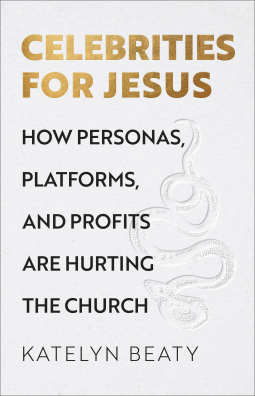
Celebrities for Jesus
How Personas, Platforms, and Profits Are Hurting the Church
by Katelyn Beaty
This title was previously available on NetGalley and is now archived.
Send NetGalley books directly to your Kindle or Kindle app
1
To read on a Kindle or Kindle app, please add kindle@netgalley.com as an approved email address to receive files in your Amazon account. Click here for step-by-step instructions.
2
Also find your Kindle email address within your Amazon account, and enter it here.
Pub Date 16 Aug 2022 | Archive Date 10 Oct 2022
Baker Academic & Brazos Press | Brazos Press
Talking about this book? Use #CelebritiesforJesus #NetGalley. More hashtag tips!
Description
The time has come for the church to reexamine its relationship with celebrity. Award-winning journalist Katelyn Beaty explores the ways fame has reshaped the American church, explains how and why celebrity is woven into the fabric of the evangelical movement, and identifies many ways fame has gone awry in recent years. She shows us how evangelical culture is uniquely attracted to celebrity gurus over and against institutions, and she offers a renewed vision of ordinary faithfulness, helping us all keep fame in its proper place. Now in paperback.
"This book is a great gift and should be required reading for all who love the church."--Rich Villodas, pastor of New Life Fellowship; author of The Deeply Formed Life
Advance Praise
“The ancient temptations Jesus experienced in the wilderness have morphed into toxic cultures of celebrity—and this is cause for great concern. Katelyn Beaty prophetically helps us to see the dangers compromising the church’s witness in the world and ways we can live with greater integrity. This book is a great gift and should be required reading for all who love the church.”—Rich Villodas, pastor of New Life Fellowship; author of The Deeply Formed Life
“The way of Jesus isn’t usually found in brands, name recognition, or programs. It’s found in relationships, humility, and servant leadership. In Celebrities for Jesus, Katelyn Beaty beautifully reminds us that pastors and churches shouldn’t try to compete with the world by looking like the world through programs, platforms, and numbers but instead should work toward resembling the life of Jesus by making ‘little Christs.’ Celebrities for Jesus is a much-needed book at this very moment in the church.”—Chris Hennessey, stay-at-home dad
“In this stupendously convicting and well-researched book, Katelyn Beaty probes the soul of the celebrity pastor, and even more hauntingly, she examines how we the people help create such larger-than-life figures. With the inexorable transition to more online forms of discipleship in the digital age, Celebrities for Jesus provides a timely, sober reflection on the toxic culture that often arises when piety and popularity mix.”—Jemar Tisby, New York Times bestselling author of The Color of Compromise and How to Fight Racism
“The word ‘celebrity’ comes from Latin and its root means ‘often repeated.’ In this book, Katelyn Beaty reveals how the stories of celebrities too often end the same way, even for those claiming to follow Jesus. With the tone of a trusted confidant, she shines a light on what happens behind the scenes of Christian celebrity culture. She illuminates the problem this presents to the church, while offering hints of ways we might change our current trajectory to prevent repeating history. It’s a timely read.”—D’Shan Berry, follower of Jesus and lover of words
“We are in the midst of a reckoning on the role of celebrity within American evangelicalism. From her position of being inside the machine, Katelyn Beaty brings two key elements to this compelling book. First, she brings knowledge and insights that will help anyone wanting to disentangle their faith from celebrity culture. But, even more than this, she offers an honest, humble self-examination that is a model many of us in the church need to follow.”—Karen Swallow Prior, research professor of English and Christianity & Culture, Southeastern Baptist Theological Seminary; author of On Reading Well: Finding the Good Life through Great Books
“This timely book offers the reader a close, revealing, and challenging look at celebrity Christianity. It doesn’t point fingers but rather holds up an overdue mirror to American Christian pop culture. Beaty’s journalism bona fides are on full display as she highlights familiar and maybe unfamiliar stories about large segments of American Christianity filled with unchecked power, manipulative charisma, and cultures of enablement. Her vulnerable self-reflection and theological survey are an added bonus that strengthens her credibility. This work contributes to a growing body of thoughtful commentary on church dysfunction with the hope of transformation.”—Christina Edmondson, leadership development consultant, Certified Cultural Intelligence facilitator, and cohost of the Truth’s Table podcast
“We are living in an age where celebrities are not just the people we see on TV or the movies, but people who have grown a following on social media—and in Christian culture, the pulpit. Katelyn’s book Celebrities for Jesus perfectly captures how and why we continuously see popular Christian celebrity leaders fall from the high towers we put them in. Amid the scandals and heartbreak caused by trusted leaders, her book was a reminder of the power of proximity and true friendship that we as a culture, and as Christians, need the most.”—Kellie Koch, strategic communications professional in Washington, DC
“With insight and empathy, Katelyn Beaty diagnoses the broken patterns of leadership we see in the church. This book shows us the isolation and loneliness and abuse that can come from, and contribute to, these expectations of celebrity. But this book is no mere jeremiad. It points the way forward to renewed visions of power, accountability, and humility.”—Russell Moore, Christianity Today
“Media stardom is a relatively new phenomenon, but the corrosiveness of power and authority is not. Celebrities for Jesus chronicles the abuses and scandals invited by the rise of eminent Christian personalities. It persuasively demonstrates that the embrace of celebrity culture is folly: whatever growth and outreach it achieves for the church comes at great personal and institutional costs.”—James Havey, attorney
“A wit once said a celebrity is a person famous for being famous, but the quip needs to be modified for American evangelical celebrities. For evangelicalism a celebrity is someone who has formed, cultivated, and platformed a persona of themselves that attracts a following. In some cases, there is substance behind the persona; in many cases, there is not. In all cases, we need a demotion of the celebrity culture and the expansion of leaders who are followers of Jesus, the Jesus whose greatness came from the surrender of himself for the sake of others. I am so glad to see Katelyn Beaty expose this very serious problem in our churches. It will be must reading for all those who want to lead.”—Scot McKnight, professor of New Testament, Northern Seminary
Available Editions
| EDITION | Other Format |
| ISBN | 9781587435188 |
| PRICE | $24.99 (USD) |
| PAGES | 208 |
Average rating from 27 members
Featured Reviews
A timely and necessary critique that pulls no punches but avoids cynicism and cruelty.
Almost everyone will agree that white evangelicalism has a Christian celebrity problem. Most critiques go no further than that or have no idea of a better way forward. This book explains how this phenomenon began and the ways that it is damaging the body of Christ.
If you are hoping to rage against celebrities and dive into an expose, then you will be disappointed. The book critiques plenty and does not mind naming names. She goes into detail to explain the destruction caused by some of the biggest names in evangelicalism. But she also shows grace. She by no means makes light of their sin nor excuses it. She describes it in harsh terms. But the focus of the book is not to look at how terrible "these people" are. Instead, it takes a wider view of the destructive power of this system that creates and platforms them in the first place. I was surprised to see how the book shows the destruction of a Christian celebrities own life. This phenomenon is not just bad for the church generally, but for their own souls.
There is a chapter that is dedicated to the Christian publishing industry's complicity in the creation of celebrities. This chapter is worth the price of the book alone. I've thought about the Christian celebrity complex plenty, but her insight into the publishing world is worth the price of the book.
What I appreciate most about this book is that it looks right at the darkness and destruction, but never loses hope. Criticism is necessary and needed, but we also need to see a better way forward. I left this book not scoffing at other celebrities and their destruction of the church. But it forced me to consider how I personally am complicit in creating them. And to ask myself if I am willing to do anything to reverse the trend.
In the end, this book is brilliant. It's short and packs a mighty punch. It provides a much-needed critique that I pray the church hears.
 Librarian 789836
Librarian 789836
When I first heard about this book, I didn't realize just how timely and relevant it would be in our present time. This is a fascinating look at the history of celebrity pastors/Christians and how they affect the Church. I will be recommending this to our patrons and those in the church.
In this timely, gracious-yet-truthful critique of the American church’s relationship with celebrity, journalist and editor Katelyn Beaty pulls back the curtain on the human heart and its love of fame—for those at the top, and those in the pews. Thank you to NetGalley and Baker Academic and Brazos Press for the advance e-copy.
Let me just start by saying, this book is crucial for the Church. Who of us have not been touched by celebrity in some way? Whether our own platform and influence are growing, or we’re fueling this dangerous position of “social power without proximity”—a false sense of intimacy—we aren’t immune to the power of fame. Beaty describes how we can adore leaders to the point we’re following them instead of Christ, where our Christian identity is wrapped up with fallen people. It’s dangerous for everyone involved: leaders are not held accountable, and our faith is so tied to them that if they crumble, our faith does, too.
Beaty delves into the first Christian celebrities, showing how mega-evangelists built up their “brand” even before the age of internet and social media, and how their celebrity power and traveling crusades eclipsed “God’s Plan A” for the world: the local church. She talks about temptations Christian leaders face: to chase platforms in the name of “doing big things for God” and “reaching more for the kingdom,” and how people’s personas (the image they project to the world) can leave those behind the personas feeling more unknown and isolated than ever—a recipe for disaster.
I love that Beaty finishes this book by highlighting the lowly obscurity of Jesus’s entrance into the world and the humility of his ministry. He didn’t seek fame; he came to serve us all. And in that, he became the most famous person who ever lived.
This is a must-read for church leaders and laypeople alike.
(note: I'll post this on social media closer to the publication date.)
 Reviewer 145564
Reviewer 145564
A needed book for this time, Beaty wrote with both honesty and compassion, holding a mirror up and inviting the reader to do the same. It's truthful but not unkind, a must-read for anyone in church leadership (or, I suggest, Christians in leadership or who attend a church).
Celebrities for Jesus is an incisive look at “how personas, platforms, and profits are hurting the church". I greatly admire Katelyn's voice and seem to align with her theology. I am a fan of her first book, A Woman's Place, and appreciate her style of both objective journalism and humor about Christian culture.
The first section of the book dives into a history of evangelicalism, megachurches, and evangelical celebrities--Billy Graham being the first. Beaty defines celebrity as "social power without proximity." The second section describes three temptations of celebrity: abusing power, chasing platforms, and creating personas. Beaty defines power as "the innate human ability to steward the world to glorify God and bless creation and fellow image bearers."
It was interesting to read Beaty's perspective on ”Christian celebrities" as she is an insider in the Christian publishing world and has a public platform as well. Pop culture fans will enjoy the stories about Justin Bieber, Kanye West, and John Mulroney that parallel the stories of Bill Hybels, Carl Lentz, Ravi Zacharias, and Mark Driscoll. I admired how Beaty manages to make a book critiquing Christian celebrity culture surprisingly hopeful and positive. She always draws readers back to the example of Jesus Christ, the ultimate leader with power who rejected celebrity. Beaty challenges us to "recapture a vision of ordinary faithfulness, a vision of the Christian life that begins and ends with producing 'little Christs'".
 Conrade Y, Reviewer
Conrade Y, Reviewer
How do celebrities for Jesus hurt the Church? Is it not a good thing to use celebrity pastors, preachers, and professors to draw in the crowds in order to listen to the gospel preached to the masses? Didn't Paul say in 1 Corinthians 9:22 that he would "become all things to all people" that people might be saved through the gospel? Well, the arguments are compelling that God could use anyone, especially flawed individuals to draw people to Him. That said, would God approve of the Church copying the ways of the world in the name of ministry? Does the ends justify the means? It all depends on motives. It also depends on which is the greater influence: Culture or Christlikeness? In this book that reflects on the virtues and vices of fame and celebrity-style ministries, we reflect on the root values that are driving people to do what they do. Three dangerous temptations lie at the root of the worldly celebrity mindset. The first temptation is the unholy use of Power. Beaty names how the famous (or infamous) Ravi Zacharias was able to captivate large audiences with his persona and persuasive words in public. Yet, his private life is filled with shameful abuse of power. Before his death, he was accused of sexual impropriety. After his death, his organization broke down after in-depth investigations exposed a history of cover-ups and multiple abuses of positions and power. Other celebrities include Mark Driscoll, whose charismatic preaching drowns out other accusations of abuse. Another charming celebrity involved in sexual scandals is the lead pastor of the famous Hillsong Church, Carl Lentz, who deceived not only his congregation but also his own family. Prosperity gospel preachers often gravitate toward the rich and the influential at the expense of the poor and needy. Their motive is the very thing they often preach about: Health and Wealth. Beaty reminds us that celebrity not only deceives people, it shields one from being investigated, and eventually isolates themselves from people.
The second temptation is about chasing platforms for fame and recognition. Some do it through publishing while others look at profits as their driving factor. If one can get famous, it will draw more people to pay attention to them. Unfortunately, when fame takes priority over the promotion of Christ, the ministry suffers eventually. Associated with fame is also the power factor. Once authors become famous, they use their name to negotiate better deals with publishing houses, especially the bigger ones. From the desire for fame lies other associated temptations like plagiarism, deception, and using dubious sources like ResultSource to gain the upper hand in the ranking of bestseller lists. The point is: Be aware of anyone using publishing to look impressive on the outside.
The third temptation is about creating persona for recognition and personal gain. The aim is to look good and project an image that people like. Such people typically try to hide their inner insecurity with impressive outer shells. While people admire such people from the outside, deep inside, one pays a high personal cost, the chief of all is loneliness.
When one yields to one or more of these temptations, eventually the ministry and the Church suffers.
My Thoughts
==============
Katelyn Beaty has given us an important reminder that the higher one climbs, the harder one falls. Ministry leaders are often faced with a stark choice: Are they serving God or are they self-serving? Let me offer three thoughts. First, ministry leaders must ask themselves: Do they want ministry success via celebrity-style or integrity-style? Before one can choose integrity, one needs to resist the temptation to chase after celebrity status. One could argue that they could do both, justifying a win-win scenario for Christ and for themselves. This is the way of the business world. Whatever the means, if one gets the result, why not? Celebrity-style ministries tend to minimize the virtuous means as long as they get the result they wanted. Captured by the temptation for success, they substitute personal integrity for public fame. Beaty warns us that while celebrity conversions can make Christianity cool, they unwittingly lead people to bark up the wrong tree. Worse, they entice others to copy what they do, repeat what they say, and imitate how they look. Integrity-style however stays true to the ways of Christ. Resisting the temptations of the world, integrity keeps one grounded in the Truth of the Gospel.
Secondly, ministry leaders must ask: Is their ministry platform built upon their identity in Christ or the worldly persona they crave after? Beware that their icons of fame do not become idols of the world that distract people from the Christ they preach or claim to preach for. With identity, one grows out of a truthful self. Otherwise, the danger is to let persona eat us up from the outside in. There will come a time in which worldly success if it comes will have no inner foundation to stand upon. Like the famous phrase, "Empty vessels make the loudest noise," if our inside is empty, what we say may become hollow words that not only lead people astray, it destroys us further.
Thirdly, we are to ask ourselves if our motivations for ministry is humility-led or pride-driven. This calls for us to consider our motives right from the start. Even then, we need to regularly do self-examinations to clear the weeds of pride. As Beaty points out to us at the end of the book, we need to take heed of what Henri Nouwen calls, the temptations of relevance, being spectacular and powerful. All of these feed off the root of pride. Instead, the way to humble ministry lies in resisting all of these.
There are lots of good stuff in this book. If you are a ministry leader, you need to read this book. If you are aiming for greater recognition in your ministry, let Beaty's book bring you back down to earth, to walk in the ways of Christ.
Katelyn Beaty is a writer, journalist, editor, and keen observer of trends in the American church. She has written for the New York Times, the New Yorker, the Washington Post, Religion News Service, Religion & Politics, and The Atlantic and has commented on faith and culture for CNN, ABC, NPR, the Associated Press, and the Canadian Broadcasting Corporation. She also cohosts the Saved by the City podcast (Religion News Service). Beaty previously served as print managing editor at Christianity Today and is the author of A Woman's Place: A Christian Vision for Your Calling in the Office, the Home, and the World.
Rating: 4.5 stars of 5.
conrade
This book has been provided courtesy of Baker Academic and NetGalley without requiring a positive review. All opinions offered above are mine unless otherwise stated or implied.
 Michelle H, Educator
Michelle H, Educator
I've followed Katelyn Beaty on Twitter for several years, so I've been eagerly anticipating this book. I was not disappointed! "Celebrities for Jesus: How Personas, Platforms, and Profits are Hurting the Church" was an incredibly insightful and eye-opening book. I appreciated how Beaty researched and detailed all the ways Christian celebrity has brought poison into the church. She did a particularly good job defining the differences between an icon and in idol.
Beaty finished her book with some incredibly profound thoughts on the importance of faithfulness, rather than celebrity. She asserts that the right form of leadership "means casting off the big ideals of living big lives for God and accepting that our greatest moments of faithfulness may be achieved in complete obscurity. Maybe it means getting back down to the roots -- to something as small as a mustard seed. To a faith that is hidden and unnoticed, barely visible to the human eye. The kingdom of God is not coming through bright lights and loudspeakers and impressive buildings and multimedia teaching series and PR specialists and strategic partnerships and viral content. It is not coming through entertaining anecdotes and polished talks and best selling books. IT is not coming through any strategy. It's not even coming through you and me. We don't build or usher in the kingdom of God. We merely attest to its reality in our lives. If only we would get out of the way."
Thank you to NetGalley for the ARC. All opinions are my own.
Note: I received a digital ARC of this book in exchange for a review.
In this book Beaty does an excellent job at examining the rise of "celebrity" and the role that it has taken up within the Christian church (in the United States). Many Christians are well-aware of public failings of celebrity pastors or ministry leaders, leaving them to wonder "how does this keep happening and what can we do about it?".
Beaty traces the history of Christian celebrity culture and examines the structures that enable and support it, such as Christian book publishing (especially interesting as Beaty both writes Christian books and works for a Christian publisher). I think it would have been easy to fall into making this a book that points fingers yelling "gotcha!" at specific individuals, but while Beaty is unafraid to mention individuals by name it never feels unfair or pointed, rather they serve as supporting examples of her overall argument calling for a willingness of ministry leaders to be smaller or more obscure, resistant to the temptation of celebrity and power.
As someone who has read the author's previous book and listened to her podcast it does strike me that she in fact has a certain level of "celebrity" herself, which she does recognize towards the end of the book..
Eye-opening accounts of what happens when wealth, fame, and power collide with spreading the words of Jesus. All of the case studies are non-Catholic personalities but there are plenty of tidbits to be chewed on here on personal conduct vis-a-vis religious activities. Accessible and incisive, this is a great addition to any public library collection for religious topics.
Beaty covers a lot of territory in answering the question that plagues me in ministry--why does evangelical Christianity continue to platform charismatic (usually) white men who let us down? What are we looking for when we do this, and what are our better alternatives? I wish I could say the answers are easy, but they're not. They will take soul searching and coordination across churches, publishing, individuals, and more. The author recognizes this and offers no simple fixes but challenges readers to talk about it and work through a healthy way of putting people in leadership. Worth reading to understand the psychology, and profit, behind our obsession with celebrity.
NOTE: I am on this book's launch team and was given an ARC
I grew up in the Los Angeles area. I am accustomed to the ways that "secular" celebrities are treated and revered. It is well past time that "Christian" celebrities be evaluated by Christ's standards rather than clinging to the ways of the world. This book is SO needed at this time. As we see White Christian Evangelical leaders fall like flies, Beaty speaks incisively and unflinchingly about the ways WCE leaders have traded Christ-likeness for Christ-promotion. She writes candidly about several facets of the WCE machine, but her notes on publishing are especially difficult. Will folks say that this book is "deconstructionist"? Of course, but only because they are the beneficiaries of a system that pretends to emulate Jesus but really emulates celebrity culture.
As soon as I saw the announcement for this book I knew I was going to want to read it.
I’ve seen firsthand the way that big personalities can creat toxic environments in the church, and Katelyn Beaty’s work was so affirming to read. Celebrity is a disease in the modern American church and she lays it all out in one digestible piece.
Beaty walks through some painful examples of what unchecked power can do to the people around celebrity personalities in the church (and man, some of these still hit pretty close to home after all the years since they happened).
This is a really great resources for others in the church looking to put words to what they might be seeing happen in their own lives. Beaty’s solution is one we might not want, but one that is so practical: our leaders need to take a step back and stop putting their following or prestige above God.
It would be perfectly reasonable if you were to expect to open up the pages of Katelyn Beaty's "Celebrities for Jesus: How Personas, Platforms, and Profits Are Hurting the Church" and experience a brutal takedown of the high power, power-seeking, and celebrity-driven culture that seems to have crept its way into evangelical churches nationwide.
After all, one need only visit social media for a few minutes to experience the wide chasm that can exist between Christians and it seems like we're inundated with a mass marketing and commercialization of faith, church, and Christianity as a whole.
However, Katelyn Beaty is a journalist and "Celebrities for Jesus" reads like exactly what it is - an incredibly well-researched and remarkably insightful and compassionate exploration of the ways that fame has reshaped the American church, how and why celebrity is woven into the tapestry of the evangelical movement, and a precise, no-holds-barred examination of how all of this has gone awry in a myriad of ways including the allowance of spiritual "gurus" of sorts to hold sway over the actual faith community.
Remarkably, while Beaty isn't hesitant at all to name names, she names names in a way that offers grace and instead of condemnation simply guides us, her readers, toward a return to a more ordinary faithfulness acknowledging gifts without allowing them to build someone into celebrity status and without turning our faith away from Christ and toward the personas, platforms, and profit-seekers who are ultimately hurting the church.
Beaty structures "Celebrities for Jesus" into three sections.
"Big Ideas" for God provides us the framework for Beaty's literary discussion including a working definition for celebrity as "social power without proximity." She then provides a historical perspective of the first evangelical celebrities and moves into a discussion of megachurches and mega-pastors. She provides a working definition of megachurch as a church with at least 2,000 members and notes that there are approximately 1,750 nationwide.
For the record, while mine is rather non-traditional I will note that only in the past year have I joined what could be considered a megachurch. It's a rarity for me having primarily attended smaller churches, church plants, and or served as an interim pastor myself in smaller churches.
The second section of "Celebrities for Jesus" is entitled "Three Temptations" and explores the abuse of power and the chasing of personas and platforms. For me, this was like a segue from an extensive and thorough history lesson into remarkably passionate and precise discourse. While I struggled in a few pages as Beaty widened the lens to explore celebrity culture in society and at large, I still found this section riveting primarily because Beaty writes it with such clarity but also with such remarkable compassion.
Finally, section three finds Beaty moving into hope by examining the basic idea that "The Way Up is Down," a theologically-based call to return to a simpler faith, an ordinary faith, and a Christianity where pastors are content to be, well, pastors.
With "Celebrities for Jesus," Beaty takes the argument that many of us have had online, myself included, and puts the research behind it. However, I must also confess that she does an extraordinary job of reminding us, also myself included, of the ways that we have contributed to the problem.
Oh, and yes I have.
Beaty examines both familiar and unfamiliar names. Beaty looks at celebrity culture in the church through a critical lens including multiple current and familiar cases. Yet, again, what's refreshing is just how remarkably gracious she is throughout the entire experience without compromising her journalistic integrity.
Speaking of which, perhaps the most powerful part of "Celebrities for Jesus" is her own examination of the faith-based publishing world of which, by the way, she is actually part of not just as a writer but having worked within the industry for years and as an employee of the publisher of this very book. In other words, she doesn't let herself off the hook.
Bravo.
This refreshing humility provides a model for self-examination and it was a self-examination that I began not long after having read the final pages of "Celebrities for Jesus." As I reflected, I began to realize the areas why I'd bought into a toxic faith culture and I began to realize the ways I'd contributed to a toxic faith culture. I also began to have a deeper appreciation for those Christian writers, singers, and actors I've encountered who at least seemed to be trying to work against it in a myriad of ways. I reflected, for example, on those writers who reached out to me genuinely (and not to sell books) after an amputation in late 2019 and how their encouragement helped me maintain faith during a particularly challenging time in my life.
Christ taught us that our lives are to be lived for others and that we are to surrender ourselves toward loving one another, a basic tenet of faith that often gets flipped when the idea of celebrity enters our churches and our faith. While she doesn't necessarily speak out truly "against" megachurches, she presents valid concerns that far too often this culture lends itself toward creating a central figurehead that becomes the public face or "celebrity" of that church. I thought to myself, for example, of the churches I know here in Indianapolis where there are multiple campuses yet they all gather on Sundays to watch a single pastor on video.
That's just weird to me.
I wish I had read a book like "Celebrities for Jesus" in seminary. It seems like the overwhelming emphasis these days is on planting and growing and marketing and building and "How can we get more people?" Far too often, that growth and outreach creates toxicity (though, as well, a non-hospitable, closed church or cliquish church can do the same).
Unsurprisingly, "Celebrities for Jesus" often reminded me of the works and writings of Kate Bowler, another writer I deeply respect and also a research-based writer.
I'm not sure what I expected from "Celebrities for Jesus," but I'm absolutely sure I got so much more and I'll be chewing on this book for quite some time. Beaty is also author of " A Woman's Place: A Christian Vision for Your Calling in the Office, the Home, and the World" and co-host of the "Saved by the City" podcast - both of which I'll be checking out in the near future!
How can a book be both gentle and uncompromising?
"An award-winning writer shows how and why celebrity is woven into the fabric of the evangelical movement, identifies many ways fame goes awry, shows us how we all unwittingly foster a celebrity culture, and offers a vision of faithfulness to the Messiah who was despised and rejected."
It's easy to find criticism against the American Church. It's difficult to find an opinion balanced with both a deep love for The Body of Christ and deep concern for its future.
In this insightful and necessary look at how our desire to get close to fame can hinder our search for Christ, turn icons into idols, and trade intimacy for illusion.
9.5/10
I'll be searching out more Katelyn Beaty, for certain.
I was delighted to receive this ARC from NetGalley and Brazos Press.
 Julia B, Reviewer
Julia B, Reviewer
Ì loved Katelyn Beaty's first book, "A Woman's Place", so I was eager to read this one. While it isn't like her last work, it has the same approachable, well-researched and amazingly written discourse. This book is about an important topic - the phenomena of celebrity in Christian culture - and she tackles it with much wisdom and grace. I appreciated this book so much, and would recommend it to anyone disillusioned by the celebrity culture and failings of many of these celebrities in Evangelicalism.
 Ashley H, Reviewer
Ashley H, Reviewer
This is such an insightful book. I appreciated Katelyn’s openness in examining how the publishing industry contributes to celebrity culture in the church. She gives a lot to think about and challenges how we view celebrity pastors. Definitely recommend
I finished this book just as news was breaking about another evangelical pastor engaging in inappropriate and immoral behavior. As someone who has grown up in mega churches and evangelical culture, this story is so familiar to me now that it barely registers or surprises me anymore.
Katelyn Beaty’s book explores the historical and current phenomenon of the “Christian celebrity” and the impacts of this celebrity on the church, their witness, and the people who sit under their teaching. She combined academic study, observation, and primary source interviews to weave together a thesis that is well supported in an accessible and easy to follow book. There’s little waste or material unconnected to her central ideas here, which I really appreciated (I supposed that’s a benefit of reading a book written by an editor!)
Thanks so much to Brazos and NetGalley for the gifted copy. All opinions are my own.
 Librarian 1023207
Librarian 1023207
Was Jesus trying to be a celebrity? Katelyn Beaty would not think so. She expresses her concern for the authentic life of the church. In this concern, she traces the growth of celebrity culture in the church. Following, with respect, the career of Billy Graham, we learn of the impact of media and how connection is lost that way. Pastors and authors can fall prey to celebrity culture, and with unwitting encouragement from ordinary folks. Her extensive footnotes at the end show her thorough research. Beaty reviews some sad collapses in Christian leadership. And importantly, she asks where everyday believers fit in. How can we keep this from happening?
As a content creator, I am, naturally, aware of the people who read my work. Celebrity status is so remote as to be laughable, but even in my little corner of the internet, Facebook nags me to “promote” my posts, and WordPress is compelled to notify me every time a new subscriber shows up. Honestly, I love knowing that my words make a difference, so I can see how the lure of celebrity could become an end in itself.
We’ve all been blessed and encouraged by believers who put their gifts on display to serve kingdom purposes. And we’ve witnessed the crash and burn of Christians who “have reached for the tool of celebrity and found that it isn’t really a tool at all. It has more power over the user than the user has over it.”
In Celebrities for Jesus, Katelyn Beaty asserts that like all of God’s good gifts, the secret to keeping the desire for influence in its rightful place is to hold it loosely. She makes the helpful observation that we are healthier when we look to the virtuous and the exceptional as icons rather than as idols. Idols replace God where icons represent him well.
Our failure to honor this boundary has contributed to the tragedies inherent to the Christian celebrity mindset: “the power without proximity” that attracts a following, deceives the leader (and her followers!), often shields the guilty, and even isolates the celebrity within a lonely spotlight.
Obviously, the book does not extend a solution to the global problem, but does emphasize the importance of accountability, community, simplicity, integrity, and humility as crucial safeguards. Ordinary faithfulness is a healthy posture, and it is, after all, the pattern set by our Savior.
Beaty’s observations are enriched by her roots in evangelical youth culture of the late 90’s and also by the historical details she gleaned through her editorial post with Christianity Today. Whether you regard the concept of “famous Christians” as good, evil, or neutral, their existence reveals something important about the heart of the church that bears examination–and perhaps even repentance.
 Lindsay O, Reviewer
Lindsay O, Reviewer
I was excited to receive a copy of this new book from @brazospress ! It’s a timely, prophetic call to the white evangelical church to examine the ways we have participated in celebrity culture, to the detriment of all involved.
Beaty examines the idea of power without proximity & the beginnings of Evangelical celebrity, as well as the temptations that come with it (abuse of power, chasing platforms, & creating personas). Her experience as a journalist lends credibility to the reporting of concrete examples of this phenomenon (stories about fallen Christian celebrities such as Ravi Zacharias, John Crist, Bill Hyels, and Mark Driscoll). I appreciate her challenge to evangelical Christians to consider how we have been complicit in the same system that has abused us. Challenges to the church that come from insiders demonstrate a love for the church that calls us to be better as opposed to a self-righteous critique.
Beaty closes the book with a consideration for a way forward in her final chapter titled, “The Obscure Messiah and Ordinary Faithfulness.” She rightly points out that her insights are not original; the church has always had prophets point to the value in leading a humble, ordinary life of love. However, it’s helpful to see this woven into our current cultural context so that we can repent and move forward into a better way.
This is an incredible and necessary look at the growth of celebrity within our Christian faith. This felt a bit like a limited series podcast at times (which I’m completely here for). I appreciated that it didn’t feel like the author was bashing others, but rather holding us ALL accountable for the parts we play. I felt convicted about the places I give Christian “celebrities” in my own life. No one belongs on a pedestal. Highly recommend. Especially those last few pages.
Many thanks to NetGalley and the publisher for an early copy.
I thoroughly enjoyed this! I read this last year when it was published and I am grateful for this perspective.
Readers who liked this book also liked:
Paula Skaggs; Josh Linden
Entertainment & Pop Culture, Nonfiction (Adult), Self-Help











